The Sodium Sulfur Batteries Market is estimated to be valued at USD 288.2 million in 2025 and is projected to reach USD 3972.5 million by 2035, registering a compound annual growth rate (CAGR) of 30.0% over the forecast period.
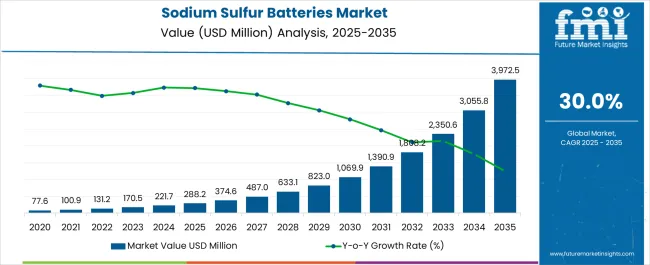
| Metric | Value |
|---|---|
| Sodium Sulfur Batteries Market Estimated Value in (2025 E) | USD 288.2 million |
| Sodium Sulfur Batteries Market Forecast Value in (2035 F) | USD 3972.5 million |
| Forecast CAGR (2025 to 2035) | 30.0% |
The sodium sulfur batteries market is witnessing steady expansion, supported by their proven role in long-duration energy storage and high-capacity grid integration. Rising demand for renewable energy sources such as solar and wind is creating a need for large-scale storage systems capable of stabilizing fluctuating power supply. Sodium sulfur technology offers high energy density, long cycle life, and cost efficiency in comparison to other large-scale storage technologies, making it an attractive choice for utilities and industrial operators.
Increasing investments in grid modernization, smart energy infrastructure, and utility-scale renewable projects are further accelerating adoption. Regulatory emphasis on decarbonization and reduction of fossil fuel dependence is also boosting demand for reliable long-duration storage systems.
Continued advancements in cell chemistry, thermal management, and production techniques are improving performance and safety standards, thereby enhancing confidence in deployment As global electricity demand rises and nations commit to clean energy transitions, sodium sulfur batteries are expected to remain a preferred storage technology for large-scale applications, paving the way for long-term growth opportunities in the market.
The sodium sulfur batteries market is segmented by application, product, and geographic regions. By application, sodium sulfur batteries market is divided into Sodium Sulfur Batteries for Load Leveling, Sodium Sulfur Batteries for Ancillary Services, Sodium Sulfur Batteries for Renewable Energy Stabilization, and Sodium Sulfur Batteries for Other Applications. In terms of product, sodium sulfur batteries market is classified into Industrial Sodium Sulfur Batteries and Private Portable Sodium Sulfur Batteries. Regionally, the sodium sulfur batteries industry is classified into North America, Latin America, Western Europe, Eastern Europe, Balkan & Baltic Countries, Russia & Belarus, Central Asia, East Asia, South Asia & Pacific, and the Middle East & Africa.
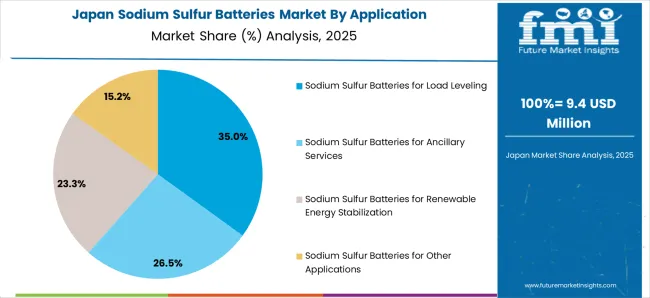
The sodium sulfur batteries for load leveling application segment is projected to hold 36.2% of the sodium sulfur batteries market revenue share in 2025, establishing itself as a leading application. This dominance is being reinforced by the ability of sodium sulfur batteries to store surplus energy during periods of low demand and discharge it during peak load times, effectively balancing grid operations.
The segment is benefiting from rising adoption by utilities aiming to enhance grid stability, reduce transmission congestion, and optimize the use of renewable energy sources. Their capability to deliver consistent output over long durations makes them particularly suitable for handling daily demand fluctuations.
The segment’s growth is further supported by regulatory initiatives that incentivize energy storage deployment for renewable integration and carbon reduction goals As countries expand renewable capacity, the role of load leveling systems using sodium sulfur batteries is becoming more critical, ensuring their continued prominence within the market.
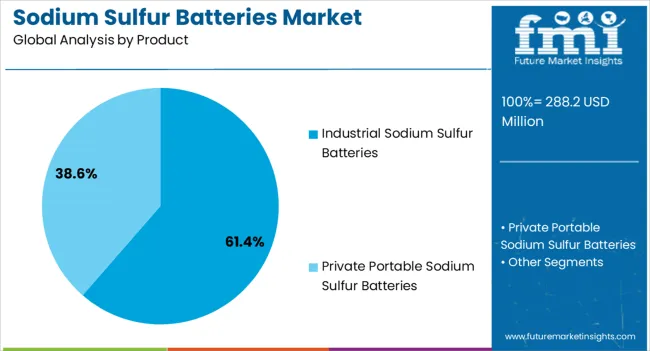
The industrial sodium sulfur batteries product segment is anticipated to account for 61.4% of the sodium sulfur batteries market revenue share in 2025, making it the dominant product category. Its leadership is being driven by increasing demand from industries requiring large-scale, high-capacity, and long-duration energy storage solutions.
The segment is benefiting from rising adoption in heavy manufacturing, chemical processing, and large commercial facilities, where uninterrupted power supply and cost efficiency are crucial. Industrial users are favoring sodium sulfur batteries due to their long cycle life, high round-trip efficiency, and ability to withstand continuous operation under demanding conditions.
Investments in industrial decarbonization and the integration of renewable energy into industrial power systems are further boosting deployment With growing emphasis on operational sustainability and energy cost optimization, industrial sodium sulfur batteries are expected to maintain their leadership position, supported by technological advancements that enhance safety, reliability, and performance in demanding environments.
Unlike bank accounts, where money is saved and used whenever it is needed, electricity is an asset that must be consumed exactly when it is generated. Energy storage is a complex process when compared to energy generation. Most of the time, we refer to how energy can be saved when it is dispatched economically in order to serve consumers in a robust and cost-effective manner.
However, technological advancements and rising electricity demand will result in dramatic changes in load characteristics around the world. The use of batteries to provide bulk power to the load will be a future trend, with a new set of regulations emerging to support the energy needs.
Moisture is a significant threat to sodium-sulfur batteries, necessitating regular battery servicing as well as individual cell inspection to ensure long-term operation. Battery servicing entails the critical task of replacing cells that show signs of leakage.
Periodic maintenance, inspection, and sealing costs, regulations on distributed energy storage (DES), and installation in inaccessible locations are likely factors limiting the global sodium sulfur batteries market's growth.
The global sodium sulfur batteries market is divided into three product categories: private portable, industrial, and other. Among these, industrial sodium-sulfur batteries had the largest market share and generated the most revenue. The global sodium-sulfur battery market is being driven by factors such as increased industrial activity, renewable installation projects, and increased demand for energy storage.
A number of constraints limit market growth, such as the highly corrosive nature of sodium polysulfides, which makes them unsuitable for portable mobile applications. Companies are addressing challenges by developing or upgrading business models, developing technology, accelerating innovation systems, developing sustainable strategies, and undertaking other major endeavors.
Because of the region's high volume of battery production, the Asia-Pacific region is expected to dominate the market during the forecast period. The Asia Pacific region is well-known for its advanced battery manufacturing industry. The shifting momentum toward renewable energy generation sources, as well as government support for it, are the most compelling factors for the widespread deployment of battery energy storage systems, either in conjunction with renewable power projects (such as wind, solar, and so on) or as standalone energy storage projects.
Countries such as China, India, and Japan have seen the greatest increase in renewable and energy storage projects. Energy storage capacity additions in China more than doubled in 2025 compared to the previous year.
North American countries, particularly the United States and Canada, are the most rapidly evolving in terms of electricity systems. The countries have seen the addition of variable renewables on a large scale, as well as large hydropower capabilities. As a result, these countries have a strong position in the global sodium sulfur battery market.
Rapid end-use applications in industries ranging from renewables to small electronic devices to large industrial facilities are fueling North America's remarkable progress in the global sodium sulfur battery market.
Some of the key participants present in the global Sodium Sulfur Batteries market include NGK Insulators Ltd, KEMET Electronics Corporation, Eagle Picher Technologies LLC, GE Energy, Ceramatec Inc, FIAMM Group, POSCO, Sieyuan Electric Co. Ltd. among others.
BASF New Business (BNB), a subsidiary of the German chemicals company BASF, will commission the energy storage system, which consists of four NAS battery containers that have been integrated into the electricity grid, at BASF's Verbund site in Antwerp, Belgium, in October 2025.
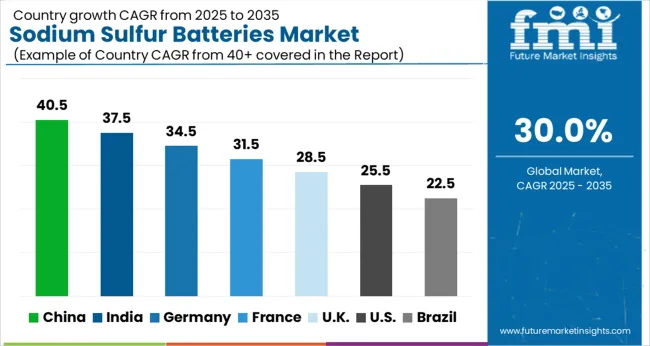
| Country | CAGR |
|---|---|
| China | 40.5% |
| India | 37.5% |
| Germany | 34.5% |
| France | 31.5% |
| UK | 28.5% |
| USA | 25.5% |
| Brazil | 22.5% |
The Sodium Sulfur Batteries Market is expected to register a CAGR of 30.0% during the forecast period, exhibiting varied country level momentum. China leads with the highest CAGR of 40.5%, followed by India at 37.5%. Developed markets such as Germany, France, and the UK continue to expand steadily, while the USA is likely to grow at consistent rates. Brazil posts the lowest CAGR at 22.5%, yet still underscores a broadly positive trajectory for the global Sodium Sulfur Batteries Market. In 2024, Germany held a dominant revenue in the Western Europe market and is expected to grow with a CAGR of 34.5%. The USA Sodium Sulfur Batteries Market is estimated to be valued at USD 104.6 million in 2025 and is anticipated to reach a valuation of USD 1014.1 million by 2035. Sales are projected to rise at a CAGR of 25.5% over the forecast period between 2025 and 2035. While Japan and South Korea markets are estimated to be valued at USD 15.7 million and USD 9.8 million respectively in 2025.
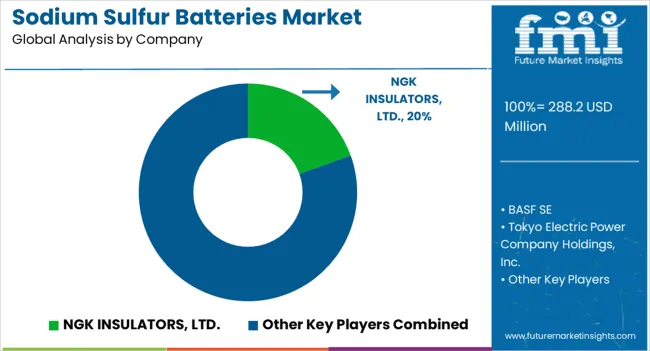
| Item | Value |
|---|---|
| Quantitative Units | USD 288.2 Million |
| Application | Sodium Sulfur Batteries for Load Leveling, Sodium Sulfur Batteries for Ancillary Services, Sodium Sulfur Batteries for Renewable Energy Stabilization, and Sodium Sulfur Batteries for Other Applications |
| Product | Industrial Sodium Sulfur Batteries and Private Portable Sodium Sulfur Batteries |
| Regions Covered | North America, Europe, Asia-Pacific, Latin America, Middle East & Africa |
| Country Covered | United States, Canada, Germany, France, United Kingdom, China, Japan, India, Brazil, South Africa |
| Key Companies Profiled | NGK INSULATORS, LTD., BASF SE, Tokyo Electric Power Company Holdings, Inc., EaglePicher Technologies, GE Energy, FIAMM Group, KEMET Corporation, POSCO, and Sieyuan Electric Co., Ltd. |
The global sodium sulfur batteries market is estimated to be valued at USD 288.2 million in 2025.
The market size for the sodium sulfur batteries market is projected to reach USD 3,972.5 million by 2035.
The sodium sulfur batteries market is expected to grow at a 30.0% CAGR between 2025 and 2035.
The key product types in sodium sulfur batteries market are sodium sulfur batteries for load leveling, sodium sulfur batteries for ancillary services, sodium sulfur batteries for renewable energy stabilization and sodium sulfur batteries for other applications.
In terms of product, industrial sodium sulfur batteries segment to command 61.4% share in the sodium sulfur batteries market in 2025.






Our Research Products

The "Full Research Suite" delivers actionable market intel, deep dives on markets or technologies, so clients act faster, cut risk, and unlock growth.

The Leaderboard benchmarks and ranks top vendors, classifying them as Established Leaders, Leading Challengers, or Disruptors & Challengers.

Locates where complements amplify value and substitutes erode it, forecasting net impact by horizon

We deliver granular, decision-grade intel: market sizing, 5-year forecasts, pricing, adoption, usage, revenue, and operational KPIs—plus competitor tracking, regulation, and value chains—across 60 countries broadly.

Spot the shifts before they hit your P&L. We track inflection points, adoption curves, pricing moves, and ecosystem plays to show where demand is heading, why it is changing, and what to do next across high-growth markets and disruptive tech

Real-time reads of user behavior. We track shifting priorities, perceptions of today’s and next-gen services, and provider experience, then pace how fast tech moves from trial to adoption, blending buyer, consumer, and channel inputs with social signals (#WhySwitch, #UX).

Partner with our analyst team to build a custom report designed around your business priorities. From analysing market trends to assessing competitors or crafting bespoke datasets, we tailor insights to your needs.
Supplier Intelligence
Discovery & Profiling
Capacity & Footprint
Performance & Risk
Compliance & Governance
Commercial Readiness
Who Supplies Whom
Scorecards & Shortlists
Playbooks & Docs
Category Intelligence
Definition & Scope
Demand & Use Cases
Cost Drivers
Market Structure
Supply Chain Map
Trade & Policy
Operating Norms
Deliverables
Buyer Intelligence
Account Basics
Spend & Scope
Procurement Model
Vendor Requirements
Terms & Policies
Entry Strategy
Pain Points & Triggers
Outputs
Pricing Analysis
Benchmarks
Trends
Should-Cost
Indexation
Landed Cost
Commercial Terms
Deliverables
Brand Analysis
Positioning & Value Prop
Share & Presence
Customer Evidence
Go-to-Market
Digital & Reputation
Compliance & Trust
KPIs & Gaps
Outputs
Full Research Suite comprises of:
Market outlook & trends analysis
Interviews & case studies
Strategic recommendations
Vendor profiles & capabilities analysis
5-year forecasts
8 regions and 60+ country-level data splits
Market segment data splits
12 months of continuous data updates
DELIVERED AS:
PDF EXCEL ONLINE
Sodium 3-Nitrobenzenesulfonate Market Size and Share Forecast Outlook 2025 to 2035
Sodium Difluorophosphate (NaDFP) Market Size and Share Forecast Outlook 2025 to 2035
Sodium Bisulfite Market Size and Share Forecast Outlook 2025 to 2035
Sodium Formate Market Size and Share Forecast Outlook 2025 to 2035
Sodium Borohydride Market Size and Share Forecast Outlook 2025 to 2035
Sodium Chloride Market Size and Share Forecast Outlook 2025 to 2035
Sodium Lactate Market Size and Share Forecast Outlook 2025 to 2035
Sodium Caprylate Market Size and Share Forecast Outlook 2025 to 2035
Sodium Caseinate Market Size and Share Forecast Outlook 2025 to 2035
Sodium Iodide Market Size and Share Forecast Outlook 2025 to 2035
Sodium Lauryl Sulphate Market Size and Share Forecast Outlook 2025 to 2035
Sodium Cumenesulfonate Market Size and Share Forecast Outlook 2025 to 2035
Sodium Stearoyl Lactate Market Size and Share Forecast Outlook 2025 to 2035
Sodium Hydrosulfite Market Size and Share Forecast Outlook 2025 to 2035
Sodium Sulphate Market Size and Share Forecast Outlook 2025 to 2035
Sodium Hyaluronate Crosslinked Market Size and Share Forecast Outlook 2025 to 2035
Sodium Malate Market Size and Share Forecast Outlook 2025 to 2035
Sodium Thiosulphate Market Size and Share Forecast Outlook 2025 to 2035
Sodium Lauroyl Isethionate Market Size and Share Forecast Outlook 2025 to 2035
Sodium Metasilicate Pentahydrate Market Size and Share Forecast Outlook 2025 to 2035

Thank you!
You will receive an email from our Business Development Manager. Please be sure to check your SPAM/JUNK folder too.
Chat With
MaRIA